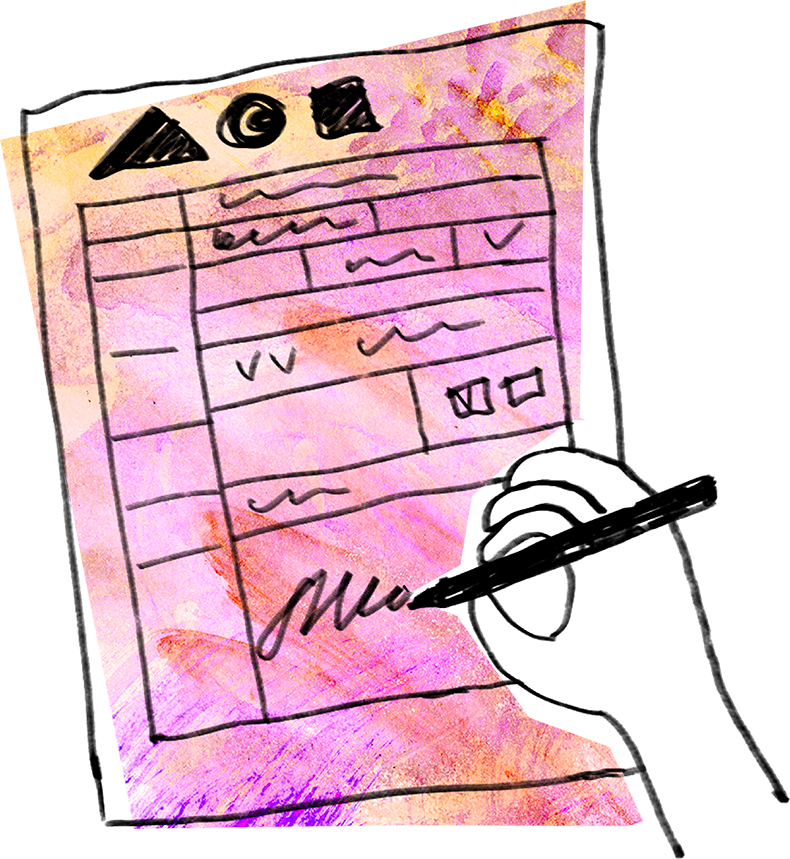Grant Application Process
How to proceed in applying grants? Where to find funders? What’s needed in the process of applying?
By Laura Lehtinen and Sirpa Lahti, Uniarts Helsinki
How to proceed in applying grants? Where to find funders? What’s needed in the process of applying?
By Laura Lehtinen and Sirpa Lahti, Uniarts Helsinki

You can apply for a grant for a wide variety of academic and artistic purposes and from numerous sources. Grants are available for artistic work, projects, purchase of an instrument or other equipment, international networking and opportunities, research, working groups, organisations and almost anything related to your learning and career.

There are hundreds of grant providers in Finland, and it’s a good idea to familiarise yourself with their mission and conditions before applying. Find a foundation that is a good match for your project. It is a waste of time for you and the funding body if you submit applications without checking whether the fund or foundation is right for you.
Information on available grants and scholarships can be found, for example here:
Artists often have several projects in progress at the same time. However, most grant providers will only award one grant to an applicant at a time. It’s up to you to decide which project you want to apply funding for. You will also often get better results by applying for specific projects that are relevant to your work, rather than sending out general applications to numerous grant providers.
Attend grant info sessions. Funding bodies organise information sessions where they provide plenty of useful information on how to apply, what kind of grants are available, and so on. Take the opportunity to ask if you have any questions. If something is puzzling you, it’s likely other applicants are puzzled by the same thing. You can also ask the funder directly if you have any questions about the application or budget but can’t find the answer on their website.
Check the application and decision-making timelines of grant providers. Note that sometimes you need to start working on the application months in advance to apply for funding on time. For example, if you start a project in June, you’ll need to know what the project will involve already eight months before, so that you can make a comprehensive enough plan and budget for it, if you want to apply for funding from the Finnish Cultural Foundation’s (FCF) main call in October. The decision on the FCF grant will come in the January or February following the call, after which you will be able to finalise the details of your project you’ll start in June.

It’s standard practice to mention the grant provider when you communicate about your project. You will find instructions on how to do this in the grant decision or on the website of the grant provider.
The leader of the working group is responsible for the use of the grant and is therefore comparable to an employer. Clearly agree with your team on the schedule for the payment of the grant, the amount of the grant in relation to working time, roles, and responsibilities. Some grant providers pay each team member directly, so the leader does not have to manage the grant for the whole team.

Note that for long-term projects (4 months or longer), you will have to pay pension insurance contributions of around 13-25% of the total amount of the grant. The percentage depends on the age of the individuals and the amount of work income. Your insurance liability is determined by the time you work in the project, regardless of whether you work part-time or full-time. So, if you receive a two-month grant but decide to extend it part-time to four months, you will have to pay pension contributions.
If you receive a grant but your plans change substantially, let the funder know. In most cases, the change is not a problem if the main objective remains the same. The funding body needs to know if the schedule, the people working on the project or the content changes.
If you are unable to accept your grant, please inform the grant provider immediately. It is also possible to reschedule or temporarily suspend a work grant.
You are allowed to earn some additional income during the grant period. So, for example, you don’t have to stop teaching part-time during the grant period. Check with your funding body for instructions on how to handle these situations.
If you don’t get funding, don’t be discouraged. Sometimes you must apply for funding for the same project several times before you get it. Although there is a lot of money to be allocated, there are also lots of applicants and only a small number of projects end up receiving funding in each call.
The grant panels or committees select the successful applicants from the pool of applications they happen to receive that time. Sometimes there are many applications with similar content in the same round and therefore your application will not be selected. Another time, your application may be successful, because the content of the other applications is different from yours or your application stands out from a group of similar proposals.
Grant committee members and decision-makers are often professionals in your field. Applying for grants is also about communicating to the members of the panel that you are an active player in the field. Even if your application is not successful, you have certainly left a mark as someone to be reckoned with.
